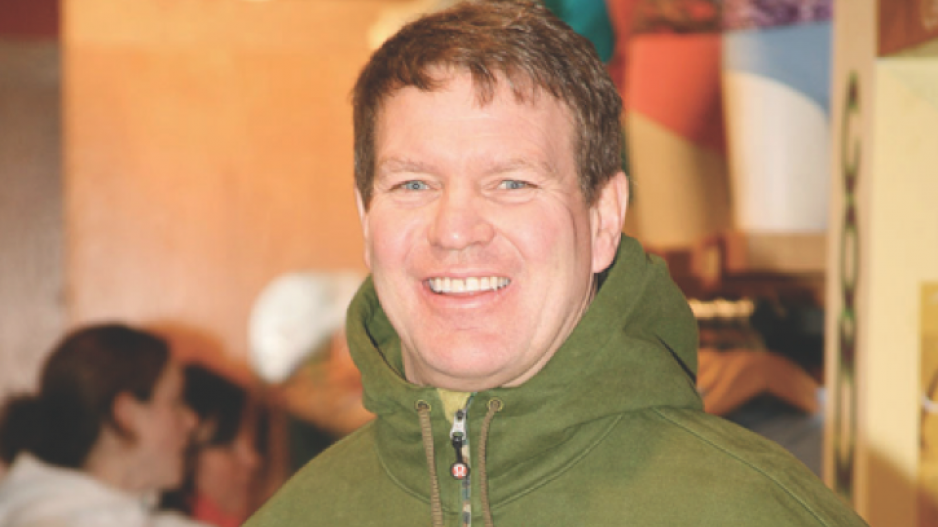Lululemon Athletica (Nasdaq:LULU) founder Chip Wilson has opinions on many topics, but he shied away from answering a question about what three moves he would make were he ever asked to return as CEO.
“I know what they are, but then it’s kind of like giving the competition too much information – as I’m the largest shareholder of Lululemon, as I’ve seen in a past CEO who had three-year options, her goal was to give away those ideas and build her name brand,” Wilson said in an interview with Business in Vancouver. “I’m long-term-driven for Lululemon, so it would be folly for me to do that.”
What isn’t folly is Wilson’s desire to see the company – which ranks at No. 7 on BIV’s list of B.C.’s most profitable companies – excel. More than a decade after he stood down as CEO and a year and a half after he quit the board of directors, he has found a novel way of exerting influence from outside the yoga-wear chain’s Kitsilano headquarters.
Over the summer, he bought space on the transit shelter outside the front door on Cornwall Street for a poster to promote his elevatelululemon.com blog. It contains three critical yet constructive entries so far, including an open letter to shareholders and a congratulatory note about the second-quarter results.
“I thought it was better for me to come off the board and see what I could do to influence the company from the outside,” he said. “I’ve been more public lately, but I thought I’d take the bus shelter out, because I wanted to influence Lululemon to be as great as I know it can be.
“It’s run so well and it’s operated so well, but there’s a big difference between operations and vision. I just don’t think it’s getting the valuations that it used to get for being a leader in the marketplace. That’s my take on it.”
The bus stop and front door are well-travelled by visitors and staff – especially those who shuttle back and forth to the Starbucks across the street. Wilson calls the unconventional approach “classic Lululemon marketing.” But will the executives take notice?
“If the C-suite don’t know it and haven’t gone by and taken a look at it, then that’s probably the first problem,” he said. “I’m talking to everybody, and I’m sure it gets up there.”
Lululemon did not respond for comment.
Wilson said the company needs to return to being quintessentially “Vancouver,” and he suggested that the next CEO should be a local athlete. To that end, Wilson recently bought a new poster at the same bus stop in the style of a giant, retro-style postcard with photographs of people relaxing on one side and what appears to be a message from Wilson on the other side.
“At Lululemon the Vancouver environment of snowy mountains and sunny oceans drove us to reinvent. It started a global industry,” the poster says.
Wilson said, “We operate much differently than any other place in the world. It’s not about what the rest of the world is doing; it’s what we’re doing here because I feel we’re that far ahead. The problem has been the company, when you have leaders that don’t understand the core underpinnings of what gives the real value to the company, especially board members, then they go to statistics.”
Elevate Lululemon is one of eight projects that fall under the umbrella of Hold It All Inc., the holding company whose name was suggested by one of Wilson’s nine-year-old twins. It includes his apparel and retail venture Kit and Ace, the Whil. mindfulness/meditation app, Ride Cycle Club studios, imagine1day Foundation, Collective, Snow Cap Equities and his real estate and development arm, Low Tide Properties.
He envisions the latter holding more than $1 billion in assets within a decade, but admits he is late to the table in this hot, headline-generating market. He hearkens back to the 1980s, when he would return from business trips to Tokyo or Hong Kong for his Westbeach skate and surf company and think, “Go buy land, Chip, buy land.’ That’s when I didn’t have two cents to rub together to my name.” Now he owns the province’s most expensive home, a $64 million Point Grey Road mansion.
“You can imagine being an Asian – all those condos, the packed world, the pollution. Vancouver looks like an oasis, with flowers and a park, it just is unbelievable. If I had money and I was living in China and wanted a better life for my family and education, Vancouver has to be the No. 1 place.”
Low Tide has bought properties in Gastown, Mount Pleasant and False Creek Flats, but a purchase in rapidly gentrifying Strathcona generated unwanted media attention earlier this year. Rising rents forced several charities to move out. Low Tide was able to find a solution for the Writers’ Exchange inner-city literacy charity.
“You’ve got a building that’s falling down and that’s why the rent is so cheap,” he said. “Either it gets fixed up or it completely falls down. The people that can afford the rent in those types of places are charities or people that are very socially driven and altruistic in their goal, and it’s a sad thing for them. I run charities too and I understand the situation. I don’t think it’s anything anyone means to do. We went in and rectified at least one of them.”
Vancouver, he said, is like Santa Monica, California, where people “whose life isn’t working perfectly for them” end up. He said the municipal, provincial and federal governments need to unite for a common cause.
“If we build it and they just keep coming, what’s the long-term solution to it?




